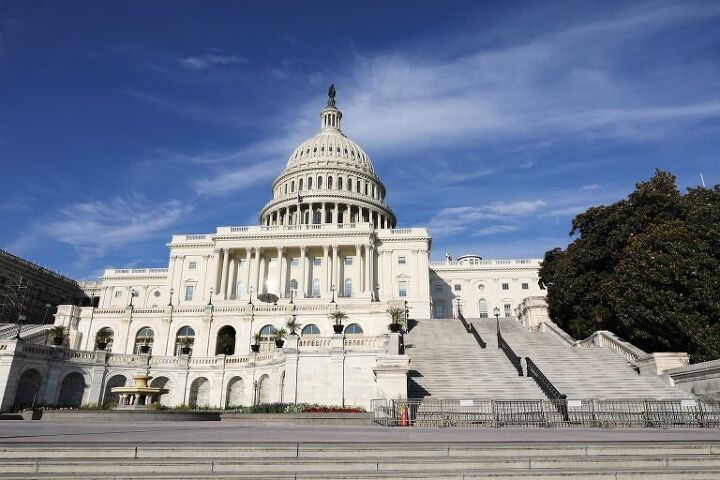Senate Approves USMCA Trade Deal Replacing NAFTA

The U.S. Senate approved changes to the North American Free Trade Agreement on Thursday, effectively replacing the 26-year-old deal with the new United States–Mexico–Canada Agreement. USMCA embraces stronger automotive content rules for the region, updates language for new technologies, and enacts sweeping labor protections aimed at uplifting the Mexican workforce. As a byproduct, it’s also likely to discourage automakers from isolating themselves south of the U.S. border in an effort to secure cheap labor.
Passing with a 89-10 vote in the Republican-controlled Senate, USMCA also allows President Donald Trump to keep his campaign promise of replacing NAFTA — a pact he often referred to as “the worst deal in history.”
Approved by the House in December of 2019, USMCA was finalized in 2018 and will now replace the 1994 North American Free Trade Agreement. Trump vowed for years to renegotiate or outright abandon NAFTA, which he faulted with the loss of millions of U.S. factory jobs to Mexico. Despite strong headwinds throughout negotiations, the deal received widespread Republican support in Congress.
It also had much more support from Democrats than many expected. However, a few high-profile politicians on the left have faulted USMCA for not addressing environmental issues that were also missed by NAFTA. “Despite the fact that it includes very good labor provisions, I am voting against USMCA because it does not address climate change, the greatest threat facing the planet,” said Senate Democratic leader Chuck Schumer.
Senator Bernie Sanders expressed similar environmental concerns, adding he believed USMCA would fail to “stop the outsourcing of American jobs to Mexico, China and other low-wage countries.” Sen. Elizabeth Warren — who is also vying to run against Trump in the next election — voted to support.
The U.S. Trade Representative’s office wasted no time in promoting the increased environmental protections in the renegotiated deal, saying USMCA goes far beyond addressing air and water pollution by ensuring violations are easily enforceable. But environmental groups like Sierra Club seem largely unconvinced. It said more needs to be done to stop companies from polluting.
For our purposes, the most noteworthy regulatory changes include a shift that requires increased North American content in cars and trucks. At least 75 percent of vehicle content must come from the region to receive tariff-free treatment, with additional mandates imposed on North American steel and aluminum. Likewise, USMCA stipulates that 40-45 percent of vehicle content must come from areas paying over $16 an hour.
Mexican legislators approved USMCA last month. Canada is expected to revisit the matter once parliament is back in session on January 27th.

A staunch consumer advocate tracking industry trends and regulation. Before joining TTAC, Matt spent a decade working for marketing and research firms based in NYC. Clients included several of the world’s largest automakers, global tire brands, and aftermarket part suppliers. Dissatisfied with the corporate world and resentful of having to wear suits everyday, he pivoted to writing about cars. Since then, that man has become an ardent supporter of the right-to-repair movement, been interviewed on the auto industry by national radio broadcasts, driven more rental cars than anyone ever should, participated in amateur rallying events, and received the requisite minimum training as sanctioned by the SCCA. Handy with a wrench, Matt grew up surrounded by Detroit auto workers and managed to get a pizza delivery job before he was legally eligible. He later found himself driving box trucks through Manhattan, guaranteeing future sympathy for actual truckers. He continues to conduct research pertaining to the automotive sector as an independent contractor and has since moved back to his native Michigan, closer to where the cars are born. A contrarian, Matt claims to prefer understeer — stating that front and all-wheel drive vehicles cater best to his driving style.
More by Matt Posky
Latest Car Reviews
Read moreLatest Product Reviews
Read moreRecent Comments
- Calrson Fan We are already seeing multiple manufacturers steering away from EVs to Hybrids & PHEVs. Suspect the market will follow. Battery tech isn't anywhere close to where it needs to be for EV's to replace ICE's. Neither is the electrical grid or charging infrastructure. PHEV's still have the drawback that if you can't charge at home your not a potential customer. I've heard stories of people with Volts that never charge them but that's a unique kind of stupidity. If you can't or don't want to charge your PHEV then just get a hybrid.
- AZFelix The last time I missed the Malibu was when one swerved into my lane and I had to brake hard to avoid a collision. 1 out of 5⭐️. Do not recommend.
- 2ACL I won't miss it; it was decent at launch, but in addition to the bad packaging, GM did little to keep it relevant in the segment. I'd prefer that another domestic automaker doesn't just give up on the mainstream sedan, but unlike some of Ford's swan songs, the Malibu made an indifferent case for why they should live.
- ToolGuy TG grows weary of purchasing gasoline. I don't care so much how or why, I am just tired of it. I still buy petroleum products, not 'boycotting oil,' but backing away from gasoline where I can. Sample size = 1.
- Probert Maybe it's not too late for the Dodge Neon I've always dreamed of!!! To the keyboard Robin!


































Comments
Join the conversation
Trump is winning on multiple fronts and will cruise to re-election in 2020. The ignorance in the comments regarding climate change never ceases to amaze. There is a whole range of future climate scenarios generated by the models; the worst case scenarios rely on positive feedback effects of increased CO2. Anyone who knows anything about control systems would know that, based on the relative stability of the climate over the last billion years, the likelihood of positive feedback in the climate system is vanishingly small. In fact, strong negative feedbacks must be present to keep the climate as stable as it has been. The media latches onto the worst case scenarios and reports that to the uninformed masses to generate clicks. The government loves the worst case scenarios because it gives them an excuse to tax energy at confiscatory rates in the name of saving the planet.
Is the thread dead yet?